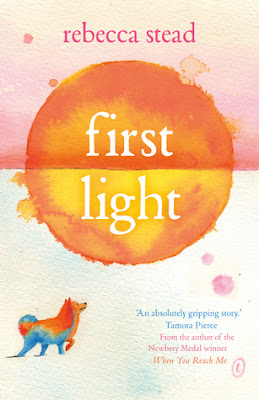Source of book: Audiobook from the library.
This is our third Rebecca Stead book. We started with When You Reach Me, which won a Newbery. We followed that up with Liar and Spy, which in retrospect seems like a benign analogy to the Q Anon phenomenon - where an obvious game is taken as if it were truth. Both books were enjoyable, although not our favorites. They have the advantage of being reasonable in length and also available on audiobook from the library. I would also say that, in an interesting way, they are all three very different while being similar in style.
First Light is Stead’s first book, and it had a fairly rough genesis. She wrote it, then made extensive changes to try to make a more coherent (and shorter) narrative. It took a few tries before she was happy with the finished product. A few of the seams still show, but overall, I think she pulled it together. It isn’t quite as polished as her later books.
I would describe the book somewhat like I did When You Reach Me, as “SciFi Realism.” The setting, characters, world, time in history, and so on, are our own. But there is a science fiction element too. In the other book, that is a time-travel plot. In this one, it is a lost civilization.
Sometime in the past, presumably during the age of sail (a whaling boat is mentioned), a group of families in England with special gifts such as acute vision or hearing finds itself persecuted as witches (probably), and flees to Greenland and a giant cavern under a giant glacier. They have some forward-thinking scientific knowledge which enables them to harness the chemical reactions that fireflies use for their own lighting, make water stay as ice at room temperature, and use hydro power for everything else. The group has sealed itself off from the outside world, and intentionally kept their population low and stable. However, after a few hundred years, people are getting restless. (Because, well, humans.)
Fast forward to the present, young Peter goes with his parents, and their assistant, Jonas, to a summer research project on the Greenland ice sheet, studying the effects of climate change. And, for his mother, something else that she isn’t telling him.
At this time, Peter is also discovering something mysterious about himself, as he begins puberty. He gets these nasty headaches, kind of like migraines, but he also finds he can zoom in over a long distance with his eyes - miles, in fact. He hasn’t figured out how to control it, but he logs his experiences.
While in Greenland, he ends up rescuing a mysterious boy who has gotten trapped in ice. Well, his dog is summoned by the dog of the girl, Thea, who is with the boy, Matthias, and he ends up helping them back. To Gracehope, the refuge of the lost people.
With the boundary breached, both Thea and Peter have a lot to learn about themselves and their history.
The story is told alternately (more or less) from the point of view of Thea and Peter. In the audiobook version, the sections are narrated by Coleen Marlo and David Ackroyd respectively. The audiobook was quite good - I thought the narrators added to the experience.
My older kids were kind of meh about this book, and I will admit that I thought her later books were better. The central idea was interesting, though, and in its final form, the plot was tight. It was, perhaps, a bit too neat and tidy. There were also a few things that left me with questions. For example, the lost civilization is mildly superstitious, but not exactly religious. Which seems weird considering the careful detail in the back story. It would be shocking if the original settlors were not some form of Christian sect, given their origins. And, along with that, the abandonment of a formal religion would have been both a striking and revolutionary development, and also an event that (given what we have seen of history) led to some sort of societal breakdown and scism. At minimum, it would have been mentioned as a huge shift in the history of the society. (Yeah, I know, it is a kids book, but…)
I think that this is one reason that Stead’s other books are better. In those, the universe of the book is much smaller. There is no historical baggage, just the worlds of the kids in the here and now. Stead is just a better writer when she focuses on the interpersonal relationships - and I think she is wonderfully nuanced in her portrayals of ordinary yet quirky kids.
In any case, not a bad book. I found it diverting, and a decent travelling book. And, as I said, the audiobook version is excellent.

No comments:
Post a Comment